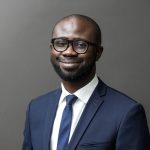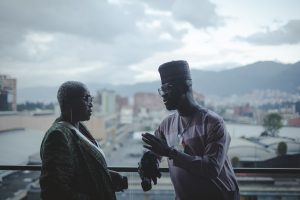Speak with a collective voice – and claim our power
06 Jun 2024
Rotimi Olawale is Executive Director and Co-Founder of Youth Hub Africa, a youth advocacy and policy-oriented organization based in Abuja, Nigeria, but programming into Africa and beyond. Rotimi’s background is as a public policy expert focusing on Youth Development.

Rotimi Olawale, Youth Hub Africa
“What the #ShiftThePower Global Summit did for me as an individual is to help me recognize the power of working together in a community – and the need for local organizations to come together at a national level, a regional level and global level,” says Rotimi. It was this recognition, a few months after the Summit, that led Rotimi to attend an event in Lagos organised by TrustAfrica on strengthening the West African Philanthropy Support Ecosystem.
“I went to the event, which maybe I wouldn’t have if I hadn’t gone to the Bogotá Summit, because I see a stronger need for civil society networks now. We need to set our own agenda and see how we can work together with a stronger voice. We need to claim our power.”
“The civil society networks we have in Nigeria are built around specific development issues. What we don’t have is a platform that brings civil society organizations (CSOs) together on common agendas beyond the issue-based networks that we have.”
Engaging with donors as a collective
At the event, the representatives of 25 CSOs discussed the creation of Nigerian networks and coalitions that could speak for CSOs, as a collective mechanism for engaging with donors, among other roles.
“If one organization gives feedback to a donor it is not going to be effective, and that CSO will be worried about saying anything negative – they won’t want to risk losing their funding. But if there’s a group of CSOs that speak with one voice, there is less risk and the message is something donors are more likely to listen to.”
“At the event, we talked about creating a public report from the network which would include collective feedback on the different donors working in Nigeria – it could include a ranking system, with different criteria, such as which donors don’t listen to CSOs, which ones are difficult, and which ones are easy to work with.”
Cross-thematic civil society platforms are already established in other African countries, such as Ghana and Kenya. Rotimi hopes to see a Nigerian one develop – as well as stronger regional networks. “It’s still too early to know how it would shape, but I think that there’s an appetite to set up a philanthropy network in Nigeria, like the ones in other countries.”
The good, the bad and the ugly of working with donors
Before the Summit, Rotimi hosted a webinar on the Good, bad and the ugly of working with donors, where the challenges stemming from power imbalances were laid out: the often tokenistic nature of many donor consultations; the setting of agendas and priorities far from communities; stringent donor requirements that many CSOs can’t meet – in qualifying for grants and in reporting once a grantee; and CSOs struggling to be sustainable with only project-based funding and shifting donor priorities.
Many of the common challenges were aired – but there were positives too. A strong theme was the need to be proactive, for CSOs to work to position themselves so they can influence agendas and build partnerships with donors.
The experience of the pre-Summit weaving conversations and the Bogotá Summit itself sharpened Rotimi’s thinking on the need for collective CSO platforms – and a more collaborative approach to development.
“Western philanthropic organizations’ approach to funding is individualistic: we issue a call for proposals, you write a good proposal, we rate your proposal and one organization in the community wins and the rest get nothing. For many organizations that means they will struggle to survive.” There’s a disconnect in this approach, Rotimi believes, with the communal sharing traditions of African societies. “CSOs are forced to compete against each other, which is not the kind of system that African societies are used to.”
With collective engagement and feedback to donors, this could change. “A group of CSOs can say we don’t support the way this funding has been structured, it’s not responding to the needs of our society or our community.”
Alternatives to competing for donor funds
Rotimi envisages a number of alternatives to the competition for grants. “I see the emergence of consortia applying for grants – this is a welcome development. In my opinion, the best consortia are those that can learn from each other, or coach each other, and where each partner brings specific expertise to the table.”
Another option is for donors to support well-established CSOs to mentor others. He’d like to see “donors providing a line of budget for mentoring, support and helping to resource the ecosystem in terms of coaching and capacity strengthening.” This approach would “align to the community spirit that already exists in Africa.”
Beyond donor funded efforts, CSOs should be looking to support each other in any case. “If a big organization has a hall space in their office, they should make this space available for free to a youth organization for a training or a strategy meeting. There are many ways organizations can support each other.”
Rotimi is also looking at alternative sources of funding as well as mobilizing local resources. “We have begun, on a small scale, to lean on our community for in-kind support. To take this further, I’m exploring how to put a dollar value on these contributions and recognize them in our financial reports – this would be a way to show the strong support that we receive from our communities, even if these were not in physical cash.”
Read more in the series #RoadFromBogotá: Perspectives on how CSOs are faring as they work to #ShiftThePower and the accompanying series #RoadFromBogotá: Perspectives on how INGOs are faring as they work to #ShiftThePower


